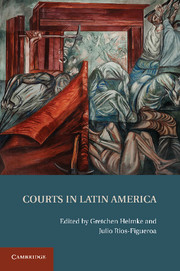Book contents
- Frontmatter
- Contents
- Contributors
- Acknowledgments
- Introduction
- 1 Institutions for Constitutional Justice in Latin America
- 2 Enforcing Rights and Exercising an Accountability Function
- 3 Strategic Deference in the Colombian Constitutional Court, 1992–2006
- 4 From Quietism to Incipient Activism
- 5 “Faithful Servants of the Regime”
- 6 Power Broker, Policy Maker, or Rights Protector?
- 7 Legalist versus Interpretativist
- 8 A Theory of the Politically Independent Judiciary
- 9 Courts, Power, and Rights in Argentina and Chile
- 10 Bolivia
- 11 The Puzzling Judicial Politics of Latin America
- Index
- References
Introduction
Courts in Latin America
Published online by Cambridge University Press: 01 June 2011
- Frontmatter
- Contents
- Contributors
- Acknowledgments
- Introduction
- 1 Institutions for Constitutional Justice in Latin America
- 2 Enforcing Rights and Exercising an Accountability Function
- 3 Strategic Deference in the Colombian Constitutional Court, 1992–2006
- 4 From Quietism to Incipient Activism
- 5 “Faithful Servants of the Regime”
- 6 Power Broker, Policy Maker, or Rights Protector?
- 7 Legalist versus Interpretativist
- 8 A Theory of the Politically Independent Judiciary
- 9 Courts, Power, and Rights in Argentina and Chile
- 10 Bolivia
- 11 The Puzzling Judicial Politics of Latin America
- Index
- References
Summary
Courts are central players in Latin American politics. Throughout the region, judges now shape policies that were once solely determined by presidents and legislators. Over the last two decades, courts have been asked to decide a litany of hot-button social, political, and economic questions. Whether reelection should be permitted, executive powers expanded, emergency economic measures upheld, presidents impeached, human rights abuses prosecuted, divorce and abortion permitted, foreign wars supported, and AIDS medication made available, these are the sorts of major policy issues now being decided by Latin American judges. As the list of areas in which courts intervene has grown, the judiciary has emerged as one of the most important – if still deeply contested – institutions in posttransition Latin American politics.
Such developments are sharply at odds with the long-standing image of Latin American courts. Weak, ineffective, dependent, incompetent, unimportant, powerless, decaying, parochial, conservative, and irrelevant – these were the adjectives used by scholars to describe the region's judicial systems for most of the twentieth century. Under dictatorship, courts were a frequent casualty of regime change, and judiciaries were largely dismissed by scholars as pawns of de facto governments. But even as democracy took root, many of the same problems identified with courts under authoritarianism – executive dominance, conservative legal philosophy, lack of adequate infrastructure, lack of public trust and support, and ongoing political instability (cf. Verner 1984) – seemed to persist.
- Type
- Chapter
- Information
- Courts in Latin America , pp. 1 - 26Publisher: Cambridge University PressPrint publication year: 2011
References
- 6
- Cited by



